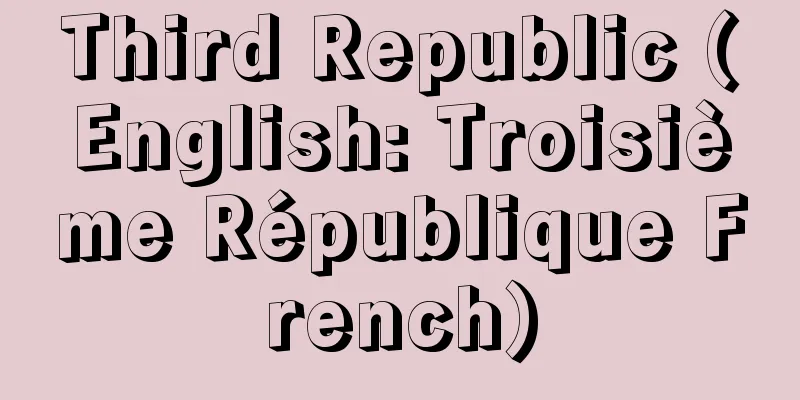Third Republic (English: Troisième République French)

|
The French republican system of government that lasted from 1870 to 1940. It was the third republic in French history, following the First Republic during the French Revolution and the Second Republic established by the February Revolution, hence the name. [Taro Nishiumi] Characteristics of the governmentThe Third Republic was characterized by the realization of a typical parliamentary democracy, and the overwhelming superiority of the will of the parliament remained unchanged throughout the republic. Under the Third Republic, the majority in the parliament was unstable due to the comings and goings of many political parties and factions, so the cabinet fluctuated significantly, and the cabinet was reshuffled and replaced a total of 108 times during the 70 years of the republic's existence. However, this was merely an appearance, and although there were several political crises, the existing system was stable for a long time. During that time, the real power of politics was held by the bureaucrats, and it was the big financial capital that was linked to the politicians and bureaucrats that basically drove politics. The Third Republic guaranteed the superiority of the bourgeoisie above all else, and while social inequality continued to exist, it gave the young people of the lower classes the possibility of promotion, and since the enactment of the law on free and compulsory secular primary education in 1882, it established a republican consciousness widely among the French people. [Taro Nishiumi] 19th century republicThe starting point of this political system was the establishment of the Government of National Defence in 1870, but the following year, after the Paris Commune (March-May), the republicans gained ground in the by-elections of the National Assembly in July, and in August, the royalist-dominated Assembly, avoiding the confirmation of a republican form of government, elected Thiers as President of the Republic, and inaugurated a conservative republic. Plans to restore the monarchy failed in 1873 and 1877, but in the meantime, the National Assembly passed a republican form of government in 1875, and the Constitution of the Third Republic was enacted, based on the separation of powers, a seven-year president, a bicameral parliament, and universal male suffrage in the lower house. In the elections held in February and March 1876 under the new constitution, the Republicans and Royalists had almost equal numbers in the Senate, and the Republicans had twice as many as the Royalists in the Lower House. Furthermore, by the beginning of 1879, the Republicans had gained the upper hand in both houses, and MacMahon, who had been president since 1873, resigned, and Greby became the third President. The victory of the Republicans was now certain, and the bourgeois moderate Republicans came to power, replacing the previous clerical royalist government based on landlords, wealthy peasants, and the upper bourgeoisie. The moderate Republicans rejected radical reforms and were known as "opportunists" because they were committed to maintaining the status quo, and their policies were lukewarm on reforms to meet the interests of the lower classes and middle class peasants, while also compromising with big capitalists in finance and industry, strengthening the bourgeois oligarchy. The moderate republican government continued until the end of the 19th century, but was opposed by the royalists/Catholics on the right and by the radicals, who developed as a party for the petty bourgeoisie and intellectuals, on the left. As socialist forces rose to power and advanced further to the left of the radicals, moderate republicans and conservative Catholicism, which shared the same enemy, showed a tendency toward harmony called the "New Spirit" following the papal encyclical of the early 1890s, and the radicals gradually shifted to the right. At this time, France was in the transition to imperialism, domestically establishing the dominance of monopoly capital in finance and industry, and externally mainly confronting Germany and forming the Russo-French Alliance in 1894, as well as acquiring vast colonies around the world, second only to Britain. During the period when imperialism was established in France, banking capital in particular developed significantly, and large amounts of capital were actively exported to underdeveloped countries in the hope of earning high profits, while domestic industrial investment was relatively low. For other reasons, industrial development was slow, with many small businesses remaining, and France's agricultural national character persisted for a long time afterwards. Stagnant population growth, below 40 million, also indicated a shortage of military forces, which was not as strong as Germany's. The enforcement of colonial policies and huge military expenditures at the end of the 19th century increased the tax burden on the people, which, along with the economic depression, increased discontent within the country. This resulted in the Boulanger affair (1887-1889), which threatened the very existence of the republic, and the Panama affair (1892-1893), which exposed political corruption. [Taro Nishiumi] From the Belle Époque to the defeat of GermanyAfter the famous Dreyfus Affair (1894-1899) at the end of the century, which caused a political crisis, the radicals came to power in the 20th century, enacted a groundbreaking law separating church and state, and France continued to develop economically and maintained external peace, ushering in the so-called "Belle Époque" (French for "Belle Époque"), the golden age of the Third Republic. However, the radical government suppressed the violent strike movements of workers who believed in revolutionary syndicalism, and in foreign affairs, it concluded the Anglo-French Entente and then the Triple Entente, before finally plunging the country into World War I. After the war, the governments of the "Bloc national" (French for "national unity"), formed by the right wing and the political center, who advocated the continuation of the wartime "sacred union", failed due to domestic and international opposition to their hardline foreign policy, the most notable of which was the occupation of the Ruhr. The governments of the "Cartel des Gauche" (Left-wing coalition) that replaced them (1924-1926) also achieved success in peaceful diplomacy during the relatively stable postwar period, but were unable to overcome their own financial crisis and resigned. A right-wing/moderate government once again emerged, bringing financial stability and a prosperous economy, and by expanding modern production facilities, transformed France from an agricultural country to an industrial one. However, the world economic depression of 1931 spread to France, and the several Radical Socialist cabinets that began the following year adopted deflationary policies and failed to overcome the depression, leading to the intensification of fascist activity within the country. In response to this, the Communist Party, the Socialist Party, and the Radical Socialist Party formed the Popular Front in 1935, and the following year a Popular Front government was formed as a three-party coalition between the Socialist Party, the Radical Socialist Party, and the Republican Social Union, but it was short-lived. Eventually, France entered World War II with the capital offensive strengthening and the conflict between the left and right forces intensifying under a Radical Socialist Party-only cabinet. France, aware of its military inferiority, turned to Britain, but in the early summer of 1940, after the German army took control of all of northern France and the Franco-German armistice was signed, Prime Minister Pétain's Vichy government plotted to abolish the republic, and as a result, on July 10 of that year, the National Assembly in Vichy, consisting of both houses of parliament, passed a bill giving the government full powers to promulgate a new constitution. The new constitution was promulgated the next day, the presidential system was abolished, and Pétain became head of the "French state" (État français), starting an authoritarian government. The above actions are considered invalid because they did not follow the formal constitutional procedure for constitutional amendment, but they effectively put an end to the democratic Third Republic. [Taro Nishiumi] Culture under the Third RepublicThe Third Republic broadly permitted individual freedom and creativity, and France, at least up until the First World War, saw a remarkable flowering in the arts and sciences that could be compared to the Renaissance. In literature, the Goncourt brothers marked a shift from romanticism to realism, followed by the naturalistic novels of Zola and Maupassant, who took realism to the extreme and dared to depict the ugliness of reality. Maupassant's novels also showed a pessimistic view of the world. Then, at the end of the century, naturalism went into decline, and Daudet's works mixed realism with sensibilité (sensitivity), while Huysmans's aversion to reality led him to Catholic mysticism. The same tendency can also be seen in the poet and critic Péguy. Entering the 20th century, Anatole France and Romain Rolland became known as rational humanist writers, while Proust left behind the greatest masterpiece of French psychological fiction. After World War I, Barbusse, Gide, Malraux and other literary figures became famous. In the field of poetry, the activities of Symbolist poets such as Mallarmé and Rimbaud were later succeeded by Valéry. In painting, impressionists such as Monet and Renoir were active, followed by post-impressionists such as Cézanne. Rodin was also famous in sculpture, and Debussy pioneered impressionist music. The philosopher Bergson preached "élan vital (the leap of life)" and had a major impact on the spirit of the times. The academic achievements of chemist and bacteriologist Pasteur, and chemist and physicist Marc Curie, who discovered radium, shine with an immortal light. [Taro Nishiumi] Yamamoto Keiichi (ed.), Study of the French Third Republic: Its Laws, Politics, and History (1966, Yushindo) ▽ Yokoyama Makoto, French Political History (1870-1958) (1968, Fukumura Publishing) ▽ Jean Bouvier, Study of French Imperialism, translated by Gonjo Yasuo and Nakahara Yoshiko (1974, Ochanomizu Shobo) ▽ Nakagi Yasuo, French Political History, Volumes 1 and 2 (1975, Miraisha) ▽ Kono Kenji, Modern French History (1977, Yamakawa Publishing) ▽ Nishiumi Taro, Study of the History of the French Third Republic: From the Paris Commune to the Anti-War and Anti-Fascist Movement (1983, Chuo University Press) ▽ Yamaguchi Toshiaki, France in the 1920s: Situation and Literature (Chuo Shinsho) ▽ "Guide to French Literature" by Kazuo Watanabe and Rikiei Suzuki (Iwanami Bunko) [References] | | | | |Source: Shogakukan Encyclopedia Nipponica About Encyclopedia Nipponica Information | Legend |
|
1870年から1940年まで続いたフランスの共和政体。フランス革命時代の第一共和政、二月革命によって樹立された第二共和政に次ぐフランス史上3番目の共和政であったので、この名称が生じた。 [西海太郎] 政体の特徴第三共和政の特色は、典型的な議会制民主主義政治を実現したことであり、議会の意思の圧倒的優位性は共和政全期を通じて変わらなかった。第三共和政下に、議会の多数派が多くの政党・政派の離合集散によって不安定であったため、内閣の変動は著しく、この共和政の存続70年間に合計108回もの内閣の改造・更迭があったが、それはいわば外見的現象にすぎず、数回の政治的危機が起こったものの、むしろ長く続く既存体制の安定が見受けられた。その間に、政治の実権は官僚に握られ、さらに政治を基本的に動かすものは政治家・官僚と結び付く大金融資本であったことが注目される。第三共和政は、なによりもブルジョアジーの優位性を保障し、社会的不平等を存在するままにしながらも下級市民層の青年にも昇進の可能性を与え、また、1882年の非宗教的無料初等義務教育法の制定以来、広くフランス民衆のなかに共和主義的意識を定着させた。 [西海太郎] 19世紀の共和政この政体の開始点は1870年の国防政府の成立にあったが、翌年、パリ・コミューンの争乱(3~5月)後、7月の国民議会の補選での共和派の進出の結果、8月、王党派優勢の議会も、共和政体の確定を避けつつ、チエールを共和国大統領に選び、保守的共和政を発足させた。王政復古計画は1873年と1877年とに失敗するが、その間に1875年、国民議会で共和政体が可決され、三権分立、7年制大統領、二院制議会、下院の男子普通選挙を根幹とする第三共和政憲法が制定された。新憲法による1876年2月と3月の選挙で、上院では共和・王党両派はほぼ同数、下院では共和派は王党派の2倍となり、さらに1879年の初めには共和派は両院に優勢を占めるに至り、1873年来の大統領マクマオンが辞職、グレビが第3代大統領となった。共和派の勝利は確定的となり、従来の地主・富農・上層有産者を基盤とする教権主義的王党派政権にかわって、ブルジョア的穏和共和派が政権の座についた。穏和共和派は、急進的改革を排し現状維持に終始して「オポルチュニスト(日和見(ひよりみ)主義者)」といわれ、その政策は、微温的な改革で小市民・中産農民の利害に対応しながら、金融・工業の大資本家と妥協し、ブルジョア寡頭支配体制を強めていった。穏和共和派政権は19世紀末まで続くが、それに対しては、右から王党=カトリック派が対抗し、左からは小市民・知識人の党派として発展した急進派が攻撃を加えた。急進派のさらに左に社会主義勢力が台頭、進出するにつれて、この勢力を共通の敵とする穏和共和主義と保守的カトリシズムとは、1890年代初めのローマ教皇の回勅に従って「新精神」とよばれる和協的傾向を示し、急進派もしだいに右傾した。 このころフランスは、帝国主義への移行期にあり、内では金融・産業における独占資本の支配を確立し、外ではおもにドイツと対立して1894年にロシア・フランス同盟を結ぶほか、イギリスに次ぐ広大な植民地を世界の各所に獲得した。帝国主義確立期のフランスでは、とくに銀行資本が非常に発展し、多額の資本が高利潤の獲得を目ざして盛んに後進諸国へ輸出され、国内産業投資は比較的少なく、他の原因もあって工業の発展は緩慢で、多数の小企業が残存し、フランスの農業国的特色はその後も長く消えなかった。4000万に達しない人口増の停滞も、ドイツに及ばない兵力の不足を示すようになった。19世紀末の植民地政策の強行と巨額軍事費の支出は国民の税負担を重くし、経済恐慌とともに国内に不満を募らせ、その結果、共和制自体を危うくしたブーランジェ事件(1887~1889)が起こり、また、パナマ事件(1892~1893)によって政治の腐敗が暴露された。 [西海太郎] ベル・エポック(よき時代)から対独敗戦まで世紀末の有名なドレフュス事件(1894~1899)による政治体制の危機を経て、20世紀になると、急進派が政権を握り、画期的な政教分離法を施行し、フランスは、経済的発展を続け、対外平和を維持しつつ、第三共和政最盛期としての、いわゆる「ベル・エポック」Belle Époque(フランス語)を迎える。しかし、急進派政府は、革命的サンジカリズムを信条とする労働者の激しいストライキ運動を抑え、外交面ではイギリス・フランス協商、ついで三国協商を締結し、やがて第一次世界大戦に突入した。戦勝後、戦時中の「神聖連合」の持続を唱える右翼と政界中央とが形成した「ブロック・ナショナル(国民団結)」Bloc national(フランス語)の諸政府は、ルール占領を顕著な例とする対外強硬策に内外の反対を受けて失敗し、かわって登場した「カルテル・デ・ゴーシュ(左翼連合)」の諸政府(1924~1926)も、国際的には戦後の相対的安定期に平和外交に成果をあげたが、自国の財政危機を打開できず退陣し、ふたたび右翼=穏和派政権が出現して財政の安定と好景気をもたらし、近代的生産設備の拡大によってフランスを戦前の農業国から工業国に転化させた。しかし、1931年世界経済恐慌がフランスにも波及し、翌年から始まる数次の急進社会党内閣は、デフレ政策をとって恐慌の克服に失敗、国内にファシズムの活動が活発化した。これに対し、1935年に共産党、社会党、急進社会党が「人民戦線」を結成し、翌年には社会党、急進社会党、共和社会同盟の三党連立の人民戦線政府が樹立されたが短命に終わった。やがて急進社会党単独内閣の下で、資本攻勢の強化と左右両勢力の対立激化のままフランスは第二次大戦を迎えた。 軍事的劣勢を自覚するフランスは、イギリスを頼りとしたが、1940年初夏、ドイツ軍の北フランス全域制圧と独仏休戦条約締結ののち、ペタン首相のビシー政府は共和制廃止を策し、その結果、同年7月10日上下両院合同からなるビシーでの国民議会は、政府に新憲法を公布するための全権を与える案を可決。翌日新憲法が公布され、大統領制は廃止されてペタンが「フランス国家」État français(フランス語)の主席となり、権威主義的政治が開始された。以上の行為は憲法上の正式の憲法改正手続に従っていないので無効ともみなされているが、事実上、民主主義的な第三共和政に終止符を打った。 [西海太郎] 第三共和政下の文化第三共和政は個人の自由と創意を幅広く認めたので、フランスは、少なくとも第一次大戦までの時期に学芸の各分野で、ルネサンスに比肩しうる著しい開花をみせた。文学では、ゴンクール兄弟がロマン主義からレアリスムへの移行を示し、ついで写実主義を徹底させて現実の醜悪さをもあえて描くゾラやモーパッサンの自然主義小説が生まれた。モーパッサンには厭世(えんせい)観が現れていた。そして、世紀末では自然主義は衰運に向かい、ドーデの作品では写実性とサンシビリテ(敏感性)との混合がみられ、ユイスマンスは現実嫌悪からカトリック神秘主義に向かった。同じ傾向は詩人・評論家ペギーにもみられる。 20世紀に入ると、合理的ヒューマニズムの作家としてアナトール・フランス、ロマン・ロランが知られ、またプルーストはフランス心理小説の最高傑作を残した。第一次大戦以後では、文学者としてバルビュス、ジッド、マルローなどが著名である。詩の分野では、マラルメ、ランボーなど象徴派詩人の活動は、のちにバレリーに引き継がれる。絵画では、モネ、ルノワールなどの印象派、ついでセザンヌなどの後期印象派が活躍した。また、彫刻ではロダンが著名であり、音楽ではドビュッシーが印象主義音楽を開拓した。哲学者ベルクソンは「エラン・ビタール(生命の飛躍)」を説いて時代精神に大きな影響を与えた。化学者・細菌学者のパスツール、化学・物理学者でラジウムを発見したキュリー夫妻の学術的偉業は、不滅の光芒(こうぼう)を放っている。 [西海太郎] 『山本桂一編『フランス第三共和政の研究――その法律・政治・歴史』(1966・有信堂)』▽『横山信著『フランス政治史(1870―1958)』(1968・福村出版)』▽『ジャン・ブーヴィエ著、権上康男・中原嘉子訳『フランス帝国主義研究』(1974・御茶の水書房)』▽『中木康夫著『フランス政治史 上・中巻』(1975・未来社)』▽『河野健二著『フランス現代史』(1977・山川出版社)』▽『西海太郎著『フランス第三共和政史研究――パリ=コミューヌから反戦=反ファシズム運動まで』(1983・中央大学出版部)』▽『山口俊章著『フランス1920年代――状況と文学』(中央新書)』▽『渡辺一夫・鈴木力衛著『フランス文学案内』(岩波文庫)』 [参照項目] | | | | |出典 小学館 日本大百科全書(ニッポニカ)日本大百科全書(ニッポニカ)について 情報 | 凡例 |
<<: Taishan Stone Carvings (English: Tai-shan-ke-shi)
>>: Tertiary Age - Daisanki (English spelling)
Recommend
Calligraphy - Kakiage
A report of a particular matter from a lower rank ...
Palus Maeotis (English spelling) PalusMaeotis
The Black Sea is an embayment in the northeastern...
Toritoma - Toritoma
A cold-resistant perennial plant of the lily fami...
Podgornyi, NV (English spelling) PodgornyiNV
...Policies toward the Third World became more ag...
Hong Liang-ji
[Born] Qianlong 11 (1746) [Died] 1809 A Chinese wr...
Archer, SA - Archer
...This is called the talbotype or calotype. In 1...
Nibugi (English spelling) er-bu-ji
A system of music for banquets and ceremonies in t...
Modest Petrovich Musorgskiy
Russian composer. Along with Balakirev, Cui, Rims...
Salicylic acid - Salicylic acid (English spelling)
Its chemical formula is C 6 H 4 (OH)COOH and it i...
Functional Disorders
...This can be seen as a shift in the social cont...
Houseboat - Ebune
A group of fishermen who lived a nomadic life, ba...
Maui [island] - Maui
An island in the US state of Hawaii. Located north...
Action - Yes
〘noun〙① (━suru) The act of something having an eff...
Saburo Obusuma - Masaburo Obusuma
...Only one volume remains, with the latter half ...
Süssmayr, FX (English spelling) SussmayrFX
…A monument to Mozart was erected at Vienna's...









